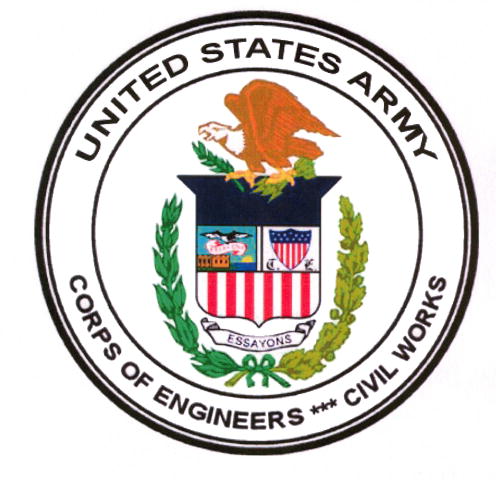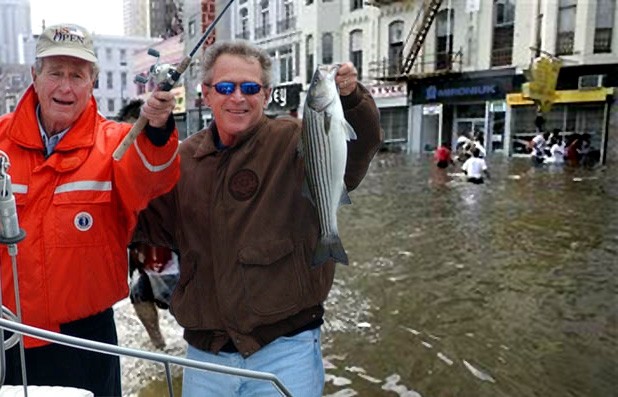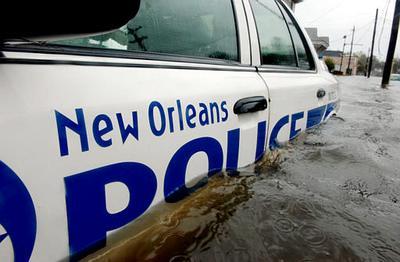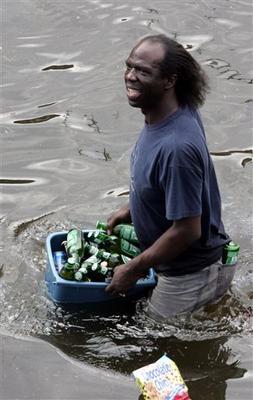LISTENING TO KATRINA
PAGES IN THIS BLOG ARE RATED 'R' AND DO CONTAIN
PROFANITY, VULGARITY, GRAPHIC VIOLENCE, NUDITY,
SCENES OF HUMAN EMOTION, DEATH, DESTRUCTION, MAYHEM, AND VARIOUS
INDESCRIBABLE HORRORS.
ANALYSIS - Armageddon Lite
Timeline: Monday, August 29, 2005, 12:00 NOON CDT
An army of water now flows freely into New Orleans through gaping holes in the walled defenses. Huge sections of 'the bowl' fill slowly, mile after mile, as the army of water conquers again the land that it once possessed. It marches across the city, and through the night it will come upon sleeping civilians and show them no mercy. Freeways become islands, off ramps become boat ramps. Hospitals can only be reached by boat or helicopter. The water will continue it's relentless advance for two days until the level equalizes with surrounding water - and all the king's horses and all the king's men cannot stop it. If the water had a general, he would stand before his troops and declare, "WHAT IS OURS, IS OURS AGAIN!"
Dark areas show flooding.

The nature of this disaster is apparent. It's all about water. The wind and the rain are minor factors in New Orleans. Moving water is the most powerful force on earth. In a very real way, water shapes the face of the planet. Too much water too fast is what overwhelmed the levee systems. If the levees had not failed, Katrina would already be a fading memory.
Mrs. Dallum, my high school journalism teacher, taught us about the six 'W's - Who, What, When, Where, Why, and How. We've covered What, When, Where, and in some cases How, but our analysis needs to go a little further. 'Why', for instance, is something we ought to know. Over the next few pages, we are going to extract many lessons from this.
After days turn into weeks and then months and then almost a year, on June 1, 2006, the COE released a document of more than 6,000 pages that details what went wrong. After spending a lot of time reading that kind of thing late into the night, listening to people, watching video, and visiting the sites personally, the bottom line isn't too mysterious.
Top ten reasons the levees failed:
1. Engineering isn't an exact science, especially when it involves mud
and water.
2. The major failures were foundation failures that, "were not
considered in the original design of these structures," according to the COE
report.
3. The engineered specification wasn't good enough.
4. The construction didn't meet the specification (which wasn't good enough
anyway).
5. Maintenance was spotty and insufficient.
6. Bad luck.
OK, so there aren't ten...
 The Corps spokesman said that the Corps has undergone a period of intense
introspection and is "deeply saddened and enormously troubled by the
suffering of so many."
The Corps spokesman said that the Corps has undergone a period of intense
introspection and is "deeply saddened and enormously troubled by the
suffering of so many."
Essentially what that means is that the Corps was standing around after the storm going, "Oops!"
This is where we let Huey stand up and preach it...
"Screw this! They're lying! The President's lying! The rich fat cats that are drowning you will do it again and again and again. They lead you into imperialist wars for profit, they take away your schools and your hope and when you complain, they blame Blacks and Jews and immigrants. Then they push your kids under."
Huey is half right. The levees are, after all, populist projects driven and funded by populist politicians. Funded when popular, and built by the lowest bidder, they are just any other campaign promise - and like all campaign promises, they have weaknesses. The Corps of Engineers people who designed the levees, the people who built them, and the people who maintained them all live here. Their homes flooded too. As much as we'd like to find a conspiracy or fraud of some kind, it doesn't really exist except in small, individual cases. There was no grand conspiracy.
We can't blame the Corps, because the Corps only does what it's told to do. They certainly asked for more resources - over and over again - but they have to do what the politicians tell them to do. No more, and no less. Yes, the specification should have been better. Less than 24 months before Katrina came, it is apparent that several people at the Corps realized that the current levees were not what they were promised to be - but Katrina came before the discussion of that could begin in earnest.
 The
politicians can be blamed then! We can blame it on Bush! Well,
we've blamed everything from cancer to sun spots on Mr. President, but the
simple fact is that the levees and other flood control projects were begun
before Mr. President was a gleam in his daddy's eye. The long parade
of federal, state, and local politicians who carried the torch for the
preparations all bear some burden. The Corps, after all, only does
what the politicians tell them to do. Unfortunately, the politicians
only do what the people tell them to do - and they will only do as much as
it takes to get elected and no more.
The
politicians can be blamed then! We can blame it on Bush! Well,
we've blamed everything from cancer to sun spots on Mr. President, but the
simple fact is that the levees and other flood control projects were begun
before Mr. President was a gleam in his daddy's eye. The long parade
of federal, state, and local politicians who carried the torch for the
preparations all bear some burden. The Corps, after all, only does
what the politicians tell them to do. Unfortunately, the politicians
only do what the people tell them to do - and they will only do as much as
it takes to get elected and no more.
 The
levees are a comedy of politics, and in a government of the people, by the
people, and for the people, whenever government screws us on something, it's
just us screwing ourselves. To make matters worse, after the screwing,
we have to sleep in the wet spot. If any one has the desperate need to
point a finger, the only place to point it is back at ourselves. The
residents of coastal areas share another blame - we all make the active
choice to live here.
The
levees are a comedy of politics, and in a government of the people, by the
people, and for the people, whenever government screws us on something, it's
just us screwing ourselves. To make matters worse, after the screwing,
we have to sleep in the wet spot. If any one has the desperate need to
point a finger, the only place to point it is back at ourselves. The
residents of coastal areas share another blame - we all make the active
choice to live here.
A levee needs to be strong enough not to fail when it fills to the top. It also needs to be durable enough so that when water flows over the top of it, it will not wash out. Unfortunately, building such structures is very expensive - more expensive than popularism can provide for - so we end up with a 'best effort'. Most of the time, that effort is good enough. For severe events, it isn't.
The entire lesson in this is, "Government preparations will meet minimum standards, but fail under stress." We're going to see that over and over and over and over and over again...not just before, during, and after Katrina, but for all other sizeable disasters as well.
The human failures before, during, and after the storm will exacerbate the natural disaster. At this point in our timeline, we've had some failures, but we have also had some incredible successes. Almost two million people were moved out of harm's way in advance of the storm. Government had a tremendous role in this, from the NOAA providing storm data to local governments coordinating with state control to stage evacuation orders in an orderly way. I think that not enough attention has been paid to these successes.
On the state level, the coordination by the DOT and state police was professional to its core. Below the Federal level, government did everything it was supposed to do. In some cases, it was done a little late, but not too late to be effective. It's almost enough to make me proud to be a Louisianaian.
 The
pride in this success, though, quickly fades as the storm comes in and
government at all levels face-plants faster than a drunk at Mardi Gras.
If you have been a survivalist for any length of time, this will not
surprise you. Everyone knows that the second anything bad happens,
government is paralyzed in all its parts.
The
pride in this success, though, quickly fades as the storm comes in and
government at all levels face-plants faster than a drunk at Mardi Gras.
If you have been a survivalist for any length of time, this will not
surprise you. Everyone knows that the second anything bad happens,
government is paralyzed in all its parts.
What few people understand, however, is why government becomes so paralyzed in times of crisis. They fail in this understanding because they have no realistic idea of what government is or how government works. We will explore that in the next few pages, but for now let's stick with the actual events.
As Katrina rolled in, infrastructure began to take damage and fall offline. The major utility is, of course, electricity. The electrical grid is a rather fragile piece of infrastructure, and none of it survives under water. Even without flooding, electrical power fails during severe weather events for a whole host of reasons. Once the power goes out, power must be supplied locally by generator power, and generators are fickle machines - they don't run under water either. Generators also require fuel, and if infrastructure is collapsing then fuel supplies will become short quickly. Power failure means the rapid failure of cell towers, broadcasting stations, water treatment and supply, sewerage treatment, cable television, internet connectivity...and a long list of other things.
The first thing that is noticed under such circumstances is communications. While fire, EMS, and police have the capability to maintain communications during a crisis, most of the civilian population does not. What was not foreseen before Katrina was that while fire, EMS, and police can communicate with each other within their districts and departments, they cannot communicate with other districts or other departments because they do not use the same systems. They could not support each other because they had no useful communication infrastructure between agencies. An effort has been made post-Katrina to remedy this.
The people who are supposed to be in charge of this mess - people like mayors and parish (county) presidents - go deaf, blind, and dumb during a widespread disaster because of the communication failures. Even in a very localized emergency - something like 9/11 - there is such a confusion of communications that it is very difficult to know what is going on.
 During
the event itself, critical infrastructure collapses, regional leadership
collapses, and critical services cease. The men and women we
usually rely on under normal circumstances - police, fire, EMS, and others -
go into a self preservation mode and they do not take calls. Their
focus turns within, and they do whatever they need to do to survive and to
protect the equipment they will need after the immediate danger is over.
During
the event itself, critical infrastructure collapses, regional leadership
collapses, and critical services cease. The men and women we
usually rely on under normal circumstances - police, fire, EMS, and others -
go into a self preservation mode and they do not take calls. Their
focus turns within, and they do whatever they need to do to survive and to
protect the equipment they will need after the immediate danger is over.
There are many examples of people who managed to contact emergency services during the course of Katrina and other storms who begged to be rescued. "We have small children! The water is rising in the house! Please come to save us!" Unfortunately, nobody was going to come because it was simply impossible to move under those conditions. You can't drive a rescue truck in six feet of water especially when the wind is blowing at 100 MPH.
Our list of lessons grows.
1. Government preparations will meet minimum standards, but fail under
stress.
2. As infrastructure collapses, power, water, communications, and
government go off line.
3. News of actual events will be delayed to some degree - often by
hours.
4. At the State and Federal level, there will be no clear
understanding of conditions on the ground for hours or days. This
failure of understanding will cause delays in providing critical support.
 Number
four is very important. I have serious doubts that on the Federal
level anyone actually understands the full impact of Katrina even today.
Officials of the State gather information from local governments and local
police departments - which means that the State is essentially blind until
the event passes and some of those local services come back online. In
the age of modern media, television and radio often provide better
information than the local authorities - especially in the early hours.
Number
four is very important. I have serious doubts that on the Federal
level anyone actually understands the full impact of Katrina even today.
Officials of the State gather information from local governments and local
police departments - which means that the State is essentially blind until
the event passes and some of those local services come back online. In
the age of modern media, television and radio often provide better
information than the local authorities - especially in the early hours.
What most people know, but fail to fully appreciate, is that any widespread disaster that affects the civilians also affects every member of the local government - from the Mayor all the way down to the most rookie police officer. Eighty percent of New Orleans Police Officers lost their homes to Katrina. I am going to devote an entire page to this idea and explain it carefully. For now, just know that in any widespread disaster that goes on for more than a few hours, you will lose not just electrical power, but every critical service upon which you commonly rely. On top of that, you will lose EMS first, police second, and firemen third. For as long as it takes for the immediate danger to pass, and for some time after, you are on your own.
It doesn't take long for certain elements to realize that they are no longer constrained by the rules of polite society. Some of these will restrict their activities to making a few beer runs, while others will take to forming armed rape gangs that rove neighborhoods looking for their next bit of fun.
Well, the rape gangs not so much. Looters fall into several different categories, and at this particular point in our timeline they aren't very active yet. That will still take a few hours. While we wait for the party to start, let's Listen to Katrina and see what she has to teach us at this point.
Shane
